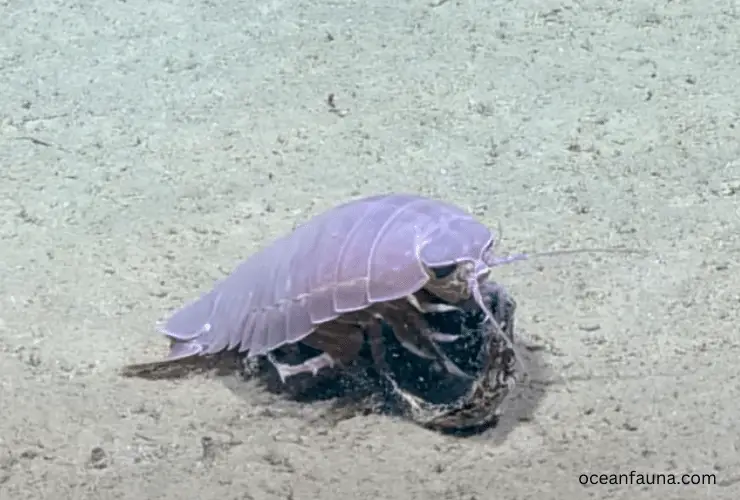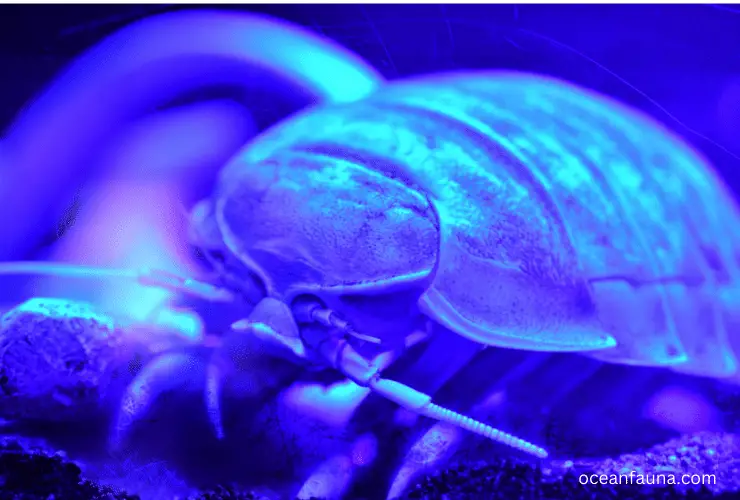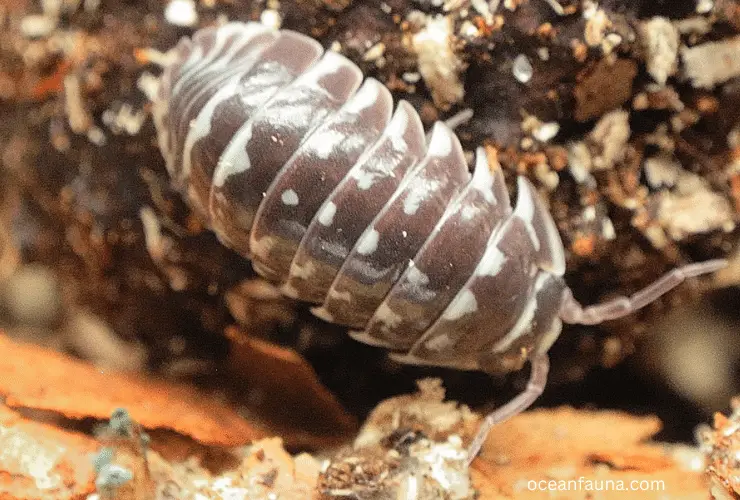Isopods literally eat anything! From fallen leaves and decaying plants to faecal materials, isopods eat anything and everything in the environment. Isopods are tiny in size and eat all types of dead and organic matter throughout the day and even at night. Although isopods don’t eat live food, there are marine isopods that hunt or eat tiny fishes in the seas and oceans.
Knowing that isopods eat everything, you might find this creepy. But do you know this little creature is helping to preserve the environmental balance? Yes, as Isopods eat the dead and organic matter in the environment, they help break down this matter into the smallest parts. And as a result, the leftovers are taken by plants as food.
The lifestyle of Isopods is surprising. And the most surprising fact is their food habits and diet. So, if you’re one of those who are eager to know about the diets of their tiny creatures, you’ve just arrived at the right place!
So, what do isopods eat? Let’s find out…
What Do Isopods Eat?
Isopods live on things that other people or animals don’t even use or see as a food source. They literally eat anything that is found in the environment after use.
Everything is a food source for isopods, from rotten vegetables to dead creatures or even cardboard.
There are more than 1000 species of Isopods. Some of them are terrestrial, while some of them are marine. Most of the isopods living on the ground eat only the leftovers. That means they only eat those that are dead or thrown away.
On the other hand, isopods that live under the ocean or sea sometimes eat tiny fishes or creatures as food.
So, there is a slight difference in the food habits of the terrestrial and marine isopods. But apart from this, they have quite similar lifestyles and food habits.
What Do Isopods Eat in the Wild?
Isopods are opportunistic. They’re not hunters. Rather they eat what they find in their way. They eat everything that they find around them and come into their living areas.
Also See: Do Isopods Bite?
So, what do isopods eat in nature? As they’re not hunters and not dangerous, they mainly live on dating fallen leaves, dead branches of trees, lichens, etc.
As isopods are tiny in size, they cannot eat more at the same time. That’s why they’re always moving in numbers and sharing food in groups.
Isopods need high doses of calcium to satisfy their body needs. So to fill this need, they eat stones and dead insects mostly.
Although they need to fill up their calcium deficiency requirements, their main food is plant-based, and they hardly eat alive insects or living organisms.
While searching for food in the deep forests or wild, isopods fertilise the soil. But how? Well, while searching for the waste, they sometimes dig up the soil to make tunnels. And as they move in groups when a ton of isopods digs the soil, a huge area is covered, and ultimately the soil becomes fertilised.
As isopods live on decaying matter, they’re often called detritivores. On top of that, they are also known as clean-up crews as they help clean up the environment by eating waste.
As isopods eat almost everything, they’re helping to keep the natural and ecological balance of the environment as well. We’ll dive deep into this matter in the latter part. So, keep reading to the end…
What Do Isopods Eat in the Ocean?
Isopods live on other animals. That means isopods are carnivores. On top of that, they are known as scavengers as well as they live by eating dead animals and plants.
As you already know, isopods live both in the wild and in the sea. In the above part, we discussed what isopods eat in the wild. They meet their calcium and other physical demands by dating stones, dead plants, dead leaves, etc.

Now the question is, what do isopods eat in the sea? How do they meet their calcium demand in the ocean?
Isopods live around 1600 ft deep in the sea or oceans. Their main food is tiny fishes, crabs, shrimp, and other tiny creatures. They meet their body requirements by eating these marine creatures in huge water depths.
Also See: How Long Do Isopods Live?
One of the most surprising things about isopods is that they can live a very long time without food. And you would be even more surprised to know that they can go for 4 years without eating anything and would survive normally.
Although isopods aren’t dangerous, sometimes they need to hunt down prey in the deep waters to fulfill their hunger. They have sensory receptors called chemoreception and mechanoreception. These two sensors help them find prey through mechanical pressure.
What Do Isopods Eat in Captivity?
Although isopods are tiny in size, they’re quite helpful. That’s why people have started to pet them as groups.
However, to pet them and help them get a long life, it’s essential to supply proper food diets to them while they’re in captivity.
So, what do isopods eat in captivity?
One main and favourite food for isopods is dry wood, leaves, and waste. So if you can manage these, it’d be quite helpful for isopods because these wastes have the required nutrients for their bodies.
For better growth and healthy life, it’s better to provide soft, moist wood such as cork or spruce. These types of foods are not only important for the growth of the isopods but also helps to create a balanced environment and maintain the overall humidity in the enclosure.
Also See: Rubber Ducky Isopod: Size, Habitat, and Facts
On the other hand, if you wish to serve decaying wood or dried leaves from the wild, you need to follow some precautions. The dried leaves or foods from outside must first be sterilised using an oven. The materials need to be kept in the oven for 30 minutes at 300 degrees Celsius to sterilise them completely.
Once the sterilisation is complete, you can now provide these to your isopods. Besides, you can store these foods for later use in a plastic airtight container.
Other than the foods found in nature or the wild. There are also supplements available for isopods as well. These supplements have all the necessary nutrients, vitamins, and calcium to ensure solid growth for these tiny bugs. And they result in quick growth and longer life span too!
Do Isopods Eat Poop?
Yes, isopods eat poop!
Well, it might sound disgusting, but isopods indeed eat poop. Faecal materials, which means waste produced by humans or other animals, is one of the foods of isopods.
Although it’s disgusting, isopods help break down their matter into the smallest unit and make it easy for plants to take them as organic or inorganic fertilisers. That’s how isopods are creating a solid impact on the environment!
Do Isopods Eat Mold?
There are quite a few misconceptions about the food habits of isopods, and this is one of them!
Not all isopods eat molds. There are a few specific specifics that have been found to eat molds, but in general, isopods don’t eat molds.
Isopods mainly eat dead organic animals or matter and are the first ones to start decomposition.
How Much Does an Isopod Eat?
Isopods cannot eat much at a time due to their tiny body structure and shape. However, they live in groups of hundreds. So even if they can eat little individually, a whole group of isopods can clear an organic matter or waste until it completely disappears.
Isopods can eat a lot in groups. And that’s one of the sole reasons why the population of isopods is increasing rapidly.
Besides, the eating rate and quantity of isopods vary depending on their type. There are giant isopods, the largest isopods that eat more than the tiny ones.
How Often Should Isopods be Fed?
Isopods should not be overfed.
Isopods love protein and calcium-enriched foods. So while feeding them, it’s recommended to supply protein-based food every week. But while supplying protein-based foods, it should be kept in mind that excess food shouldn’t be supplied!

The proper amount of food should be which they can eat in a single sitting. The reason is if excess foods are supplied, there is a high chance that the isopods won’t be able to consume them fully, resulting in spoiling and stinking!
Foods to Avoid for Isopods?
Although isopods are known to eat anything and everything, there are certainly some foods that need to be avoided.
If you’re one of those who are growing isopods in captivity for commercial purposes, this segment is extremely important for you.
It’s recommended not to provide foods like fish flakes, rice, cereal, and dog foods to isopods. Experts have tested these foods, and the result is negative!
· Fish Flakes
Some people think that fish flakes are a high source of protein and use them as foods for isopods, but little do they know that these are harming tiny creatures. Fish flakes attract detritivorous mites. Due to this, the life of isopods might be at risk.
· Rice
Uncooked or overcooked rice is a reason that allows for the proliferation of flying pests. So, if the isopods are fed with rice, there’s a high risk that the isopods can get attacked by other pests and insects. So, to avoid such circumstances, it’s highly recommended to provide rice-type items to isopods.
· Cereal and Dog Food
Like the foods mentioned above, cereal and dog foods also attract unwanted insects and bugs. Alongside this, they are also the reason slow down the growth of the isopods. So, if you want to ensure the proper growth of your isopods healthily, it’s better to avoid these creatures and dog foods!
Things To Consider While Feeding Your Isopods
Isopods are tiny creatures. They can only eat a little at a time. Besides, they have solid immunity and can live almost 4 hours without eating anything.
Just like other creatures and animals, there are some things that you need to consider while feeding the isopods that are in captivity. The natural ones know their limits and would only eat what they can take.
If you’re planning to provide supplements to your isopods, don’t overuse the foods or force the tiny creatures to eat beyond their limits. The reason is, providing more food than the limit will ultimately be a loss. Secondly, the leftover foods have a higher chance of attracting unwanted bugs and pests. This will create problems in the living habitat of the isopods!
FAQ
Will isopods eat cardboard?
Ans: Yes, isopods eat cardboard. Alongside eating dried leaves, decaying wood, and leaf litter, cardboard are one of the other main items in the diet of isopods.
Do isopods eat eggshells?
Ans: Isopods are calcium lovers. Their body needs calcium for fast growth and to maintain balance. As eggshells contain a high amount of calcium and are found commonly in the surroundings, they are taken as food by isopods most of the time.
However, due to the thickness of the eggshells, it takes over a month for isopods to finish them completely.
Do isopods eat dead bugs?
Ans: Yes, isopods eat dead bugs and insects. Isopods are not hunters or dangerous. But they’re opportunistic. They hardly attack other creatures and depend mainly on dead animals. Dead bugs are available in the wild, so they’re the main source of food for isopods.
Conclusions
So that’s all about knowing about the food habits of isopods.
The food habits and diet of isopods vary from species to species and type to type. The terrestrial ones mainly live on dry leaves, faecal materials, and other dead insects and animals. On the other hand, the marine ones hunt down tiny shrimps and fish to satisfy their hunger.
The food habits and the diet of this tiny creature are indeed mysterious. As they eat almost all types of things in nature, they’re also helping nature maintain the ecological balance.
So, what do isopods eat? Well, we believe you’ve got your answer. In case we missed anything, feel free to comment below and enlighten us about those facts. Thank you!


3 thoughts on “What Do Isopods Eat? Complete Food List”